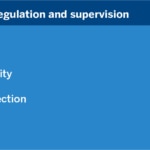Fintech regulation: seeking a level playing field for everyone
Banks and fintechs should compete on the same playing field, and this poses a great challenge to financial supervision and regulation. Santiago Fernández de Lis, Chief Economist, Financial Systems and Regulation at BBVA Research, in a recent report entitled Fintech: Key Regulatory Challenges reviews the regulatory priorities posed by the digital disruption of financial services. In his opinion, the focus of policy for regulating fintech companies should be to build “a level playing field for all providers to properly address the risks and guarantee fair competition.”

The relationship with the consumer through digital channels, with automated advice and new intermediaries; new products, both in the payment segment and in credits, deposits and investment; and the creation of a new banking infrastructure, have all disrupted, not only the sector, but also the regulators and supervisors, which on many occasions have been one step behind financial innovation.
For that reason, regulators and supervisors have to evaluate these innovations in light of their traditional objectives: efficiency, financial stability, consumer protection and the integrity of the sector, according to BBVA Research.
The focus of policy for regulating fintech companies should be to build a level playing field for all providers to properly address the risks and guarantee fair competition"

BBVA Research
Challenges and benefits of the digital era for financial regulation
As regards efficiency, the benefits of digital transformation are noted in automation, disintermediation with technologies such as blockchain, greater flexibility and scalability of technological infrastructures, growing competition and lower costs.
For financial stability, the digital era poses the challenge of managing the new technological risks, the relationship with new suppliers, the increased pressure on the profitability of banks and growing volatility. At the same time, these transformations have clearly positive impacts, as they promote a more diverse ecosystem and new tools arise to manage the risks.
From the point of view of consumer protection, the new technologies suppose a tremendous improvement, since they put the consumer at the center of decisions, improve control and traceability of the interactions with customers, and give them greater independence. On the other hand, theyº pose new security risks and data protection issues, especially insofar as the new players enter the market with rules that are more lax.
As for the integrity of the sector (especially as it relates to the struggle against money laundering), digital disruption supposes a better system for following and analyzing transactions. But it also raises doubts about issues such as virtual currencies and payment systems, apart from the digital authentication of customers.

BBVA Research
Same services, same regulation
BBVA Research believes that activities with similar levels of risk should have the same regulatory treatment, regardless of who performs them, in order to foment financial stability, consumer protection and the integrity of the system. Likewise, it recommends eliminating unnecessary barriers to competition, in the access to payment infrastructures, the use of customer data provided there is consent, and a clear supervisory and regulatory framework.
In this environment, prudential banking standards and regulatory loopholes frequently lead to asymmetries between competitors, i.e. banks, subject to stricter regulations, and less-regulated non-bank players.
How can these asymmetries be reduced? BBVA Research proposes three ways: Limiting the scope of prudential regulation for fintech activities for non-core businesses, address existing gaps in the regulations for new entrants and facilitate innovation for all players through regulatory sandboxes.
Data regulation, a key factor
Data is a pivotal strategic asset in the digital economy and might also be a source for the construction of a level playing field for all participants in the digital ecosystem. Thus, regulations on the accessibility/portability of clients’ data have broad implications for consumer protection, competition and the structure of the financial services market.
European authorities are considering the above issues in setting their regulatory stance on fintech, regarding new business models and services, identifying new sources of risk and promoting innovation and competition.
The European Union has defined the guiding principles of its policy, which is aimed at fostering access to financial services, increasing efficiency for the industry, lowering entry barriers to the sector and balancing data sharing with security and protection. Also, the European Banking Authority recently published its lines of action of its approach to fintech. Europe also faces the coming into force of two new regulations to govern, on the one hand, payments systems (PSD2), and the access to customer data on the other (GDPR).
It is important that access to customer data, always with their consent, is regulated in a way such that banks are allowed to compete on an equal footing with tech giants. Also, it is pivotal to prevent sectoral regulations such as PSD2 from creating asymmetries between players in a digital context in which the boundaries between sectors are becoming blurred.